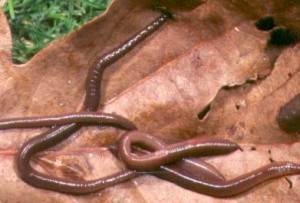Earthworms have chemical compounds that help them overcome toxic plant defenses to digest difficult leaf litter.
Researchers have identified unique chemical compounds in the digestive tracts of earthworm species which counteract the defensive toxins produced by plants, allowing earthworms to consume them safely.
Many plants produce defensive chemicals called polyphenols. By binding gut enzymes, polyphenols inhibit the digestion of plant matter. Dead plants retain these chemicals even as they fall to the soil, discouraging would-be decomposers in the process.
A team of researchers have identified molecules in the earthworm gut that counteract the plant’s natural defenses and enable digestion. They are able to digest fallen leaves and other plant material, thanks to the ability of drilodefensins to counteract polyphenols.
Earthworms are responsible for returning the carbon locked inside dead plant material back into the ground. They drag fallen leaves and other plant material down from the surface and eat them, enriching the soil, and they do this in spite of toxic chemicals produced by plants to deter herbivores.
Earthworms are known for their indiscriminate digestive tracts, so perhaps it comes as no surprise that they can digest some plant toxins without difficulty. They have a metabolic coping mechanism to deal with a range of leaf litter diets. In this role, drilodefensin support the role of earthworm as key “ecosystem engineers” within the carbon cycle.
These molecules in the earthworm gut, which have been named drilodefensins, are so abundant that the researchers estimate that for every person on earth there is at least 1kg of drilodefensins present within the earthworms that populate the world’s soils.
Their abundance is not an excess .Drilodefensins are so precious that earthworms recycle the molecules in order to harness their effects again. . The team found that the more polyphenols present in the earthworm diet, the more drilodefensins they produce in their guts.
Without drilodefensins, fallen leaves would remain on the surface of the ground for a very long time, building up to a thick layer and the whole system of carbon cycling would be disrupted.
Earthworms have evolved a different solution altogether. Their guts produce drilodefensins, which disrupt the chemical properties of polyphenols. These compounds are classified as surfactants, which act a lot like detergents. A large amount of purified drilodefensins could clean your dishes.
For more information please visit: www.ceh.ac.uk


Comments are closed.